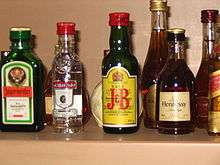Rectified spirit

Rectified spirit, also known as neutral spirits, rectified alcohol, or ethyl alcohol of agricultural origin[1] is highly concentrated ethanol which has been purified by means of repeated distillation, a process that is called rectification. In some countries (e.g. India), denatured alcohol or denatured rectified spirit may commonly be available as "rectified spirit", but this is poisonous and depending on one's body size, ingestion can be fatal.
It typically contains 95% alcohol by volume (ABV) (190 US proof). The purity of rectified spirit has a practical limit of 95.6% ABV when produced using conventional distillation processes, because a mixture of ethanol and water becomes a minimum-boiling azeotrope at this concentration.
Neutral spirits can be produced from grain, corn, grapes, sugar beets, sugarcane, tuber, or other fermented plant material. In particular, large quantities of neutral alcohol are distilled from wine. Such a product made from grain is "grain neutral spirit", while such a spirit made from grapes is called "grape neutral spirit",[2] or "vinous alcohol".[3]
Neutral spirits are used in the production of blended whisky, cut brandy, some liqueurs, and some bitters. As a consumer product, it is almost always mixed with other beverages to create such drinks as punch, or is sometimes added to cocktails in place of vodka or rum and is used in Jello shots.[4] It is also used to make homemade liqueurs, such as limoncello, and in cooking because its high concentration of alcohol acts as a solvent to extract flavors.[5] Rectified spirits are also used for medicinal tinctures, and as a household solvent. It is sometimes drunk undiluted, however as the alcohol is very high-proof, overconsumption can cause alcohol poisoning more quickly than with more traditional distilled spirits.[6]
Regional
United States
Neutral spirit is legally defined as spirit distilled from any material distilled at or above 95% ABV (190 US proof) and bottled at or above 40% ABV.[2] When the term is used in an informal context rather than as a term of U.S. law, any distilled spirit of high alcohol purity (e.g., 170 proof or higher) that does not contain added flavoring may be referred to as neutral alcohol.[7] Prominent brands of neutral spirits sold in the US:
- Everclear
- Gem Clear
- Golden Grain Alcohol
"Grain spirits" is a legal classification for neutral spirit that is distilled from fermented grain mash and stored in oak containers.[2]
Retail availability
Availability of neutral spirit for retail purchase varies between states. States where consumer sales of neutral spirit are prohibited include Minnesota,[8] Florida,[9] Hawaii, Maine, Nevada,[10] North Carolina,[11] and West Virginia. In Virginia, the purchase of neutral spirits requires a no-cost "Grain Alcohol Permit", issued "strictly for industrial, commercial, culinary or medicinal use".[12]
UK
It is also available in the UK via online stockists.[13]
Germany
In German, rectified spirit is generically called Primasprit (colloquial) or, more technically, Neutralalkohol. It contains 95.6% alcohol (191.2 US proof) and is usually available in pharmacies only (some Russian food stores do sell it as well). In the former East Germany, it was available in regular stores.
In Germany, Primasprit is most often used for making homemade liqueurs; other types of use are rare. Most of the Primasprit produced in Germany is made from grain and is therefore a neutral grain spirit.
See also
References
- ↑ E.U. Definitions of Categories of Spirit Drinks 110/2008, M(b), 2008
- 1 2 3 27 C.F.R. 5.22(a) Class 1
- ↑ Results of sales of vinous alcohol held by public agencies
- ↑ "Drink Recipe Browser: Everclear drinks". Drinknation. 2010. Retrieved 17 November 2010.
- ↑ Walton, Stuart; Norma Miller (2000). An Encyclopedia of Spirits & Liqueurs and How to Cook with Them. London: Hermes House. ISBN 1-84215-154-1.
- ↑ Sonja Sharp; Kenneth Lovett (2010). "That's the spirit! State approves 192-proof Spirytus, allowing New Yorkers to get quite the buzz". The Daily News.
- ↑ Lichine, Alexis. Alexis Lichine's New Encyclopedia of Wines & Spirits (New York: Alfred A. Knopf, 1987), 365.
- ↑ https://www.revisor.mn.gov/statutes/?id=340A.506 MN 340A.506
- ↑ 2009 Florida Statutes, Title XXXIV
- ↑ NRS: CHAPTER 202 - CRIMES AGAINST PUBLIC HEALTH AND SAFETY
- ↑ ABC Commission to end sales of 190-proof booze | Cape Fear Watchdogs
- ↑ Virginia Department of Alcoholic Beverage Control "Permits"
- ↑ https://www.thewhiskyexchange.com/P-15105.aspx


